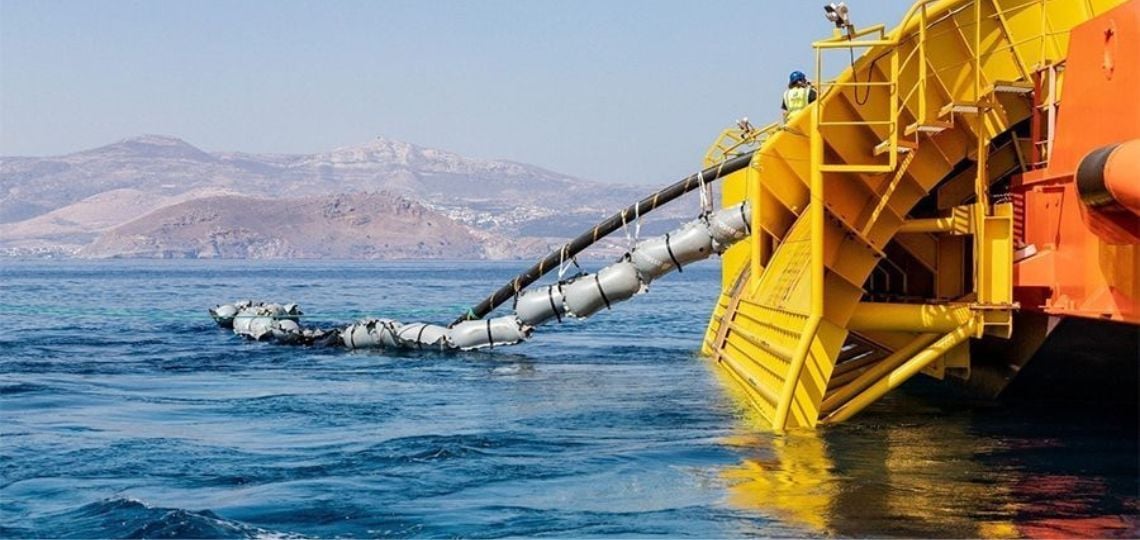Agreement between Greece and Cyprus for the Great Sea Interconnector submarine cable

Greece and Cyprus have reached a new milestone in the Great Sea Interconnector (GSI), a project to connect the Cypriot electricity grid to that of mainland Europe.
This agreement formalizes an essential partnership for securing electricity supplies and for Cyprus’ energy transition.
The submarine cable, estimated to be 1,240 kilometers long, will enable the island to integrate into European power grids, while reducing its dependence on heavy fuel oil. The agreement signed between the two countries comes after several months of negotiations, notably concerning financial aspects and the risks associated with potential delays.
The GSI is seen as a strategic project for the European Union, as it aims to strengthen energy integration in the Mediterranean region while increasing the resilience of energy infrastructures.
With a total estimated cost of 1.9 billion euros, this project, which will also extend to Israel, is one of a number of initiatives aimed at securing supplies while promoting the decarbonization of the energy sector.
Cyprus, an essential link in the energy transition
Cyprus, although endowed with natural gas reserves, has not yet exploited these resources for power generation.
Currently, the island is heavily dependent on imports of heavy fuel oil to power its power plants, resulting in high energy costs for consumers.
The Great Sea Interconnector would reduce this dependence by offering Cyprus access to electricity generated on the European mainland, where renewable sources are increasingly developed.
The project is also seen as an opportunity for Cyprus to play a more central role in regional electricity trade.
By positioning itself as a transit point between the European continent and the Mediterranean basin, Greece strengthens its position on the European energy scene.
The interconnection would also make it easier to import and export electricity, thereby reinforcing the stability of power grids in the region.
Financing and economic outlook
Financing for the Great Sea Interconnector project is largely based on European subsidies, with the participation of the European Investment Bank (EIB), which sees the project as a means of stabilizing and diversifying energy supplies.
The European Union, through its cross-border energy infrastructure financing facility, is playing a key role in providing financial support for this initiative.
The long-term economic outlook for Cyprus is promising.
By reducing its energy costs and integrating the European electricity market, the island could benefit from greater competitiveness in industrial sectors.
In addition, this interconnection strengthens energy security by diversifying sources of supply and offering an alternative to fossil fuels.
Greece’s role in regional interconnection
Greece, which has succeeded in diversifying its sources of energy production by increasing the use of renewable energies, sees the GSI project as an opportunity to consolidate its role as an energy distribution hub in the Mediterranean basin.
By connecting to Israel via Cyprus, the project will enable surplus electricity from renewable sources, particularly solar power, to be integrated into the European grid.
Greece’s geographical position as a crossroads between Europe and the Middle East is a strategic asset for the development of energy infrastructures of this kind.
The Greek authorities see GSI as a key element in their energy strategy, not only to enhance security of supply, but also to meet the decarbonization targets set by the European Union.
Technical and environmental challenges
Despite the obvious economic and strategic advantages, the Great Sea Interconnector also presents significant technical challenges.
The cable will be installed at a depth of 3,000 meters under the sea, making it one of the deepest cables ever built.
The complexity of the installation and the extreme submarine conditions require cutting-edge technical expertise and considerable investment to ensure the long-term reliability of the infrastructure.
The Cypriot authorities expressed concern about the potential costs associated with possible construction delays and future maintenance of the infrastructure.
However, these concerns have been partially allayed by the signing of the agreement, which clarifies the responsibilities and financial commitments of the parties involved.
The Great Sea Interconnector project represents a turning point in the integration of electricity networks in the Eastern Mediterranean.
By linking Cyprus to Europe, this project is in line with the European Union’s desire to secure its supplies while facilitating the energy transition in regions hitherto isolated from the continental grid.
Related
Zelenskyy reiterates call for air truce after huge Russian attack…
We need Russia to stop attacks, Zelenskyy says, backing calls for truce in air, at seaUkrainian president Volodymyr Zelenskyy has responded to overnight attacks
Europe scrambles to rearm as Trump threatens security guarantees and…
CNN — European leaders have vowed to rearm the continent at historic emergency talks h
Russia launches ‘massive’ attack on Ukraine after Europe rushes to…
Ukraine's energy and gas infrastructure came "under massive missile and drone shelling" by Russia on Friday, a Ukrainian minister said."The energy and gas infra
American severance may be averted, but Europe’s leaders must fear…
With a mixture of regret, laced with incredulity, European leaders gathered in Brussels to marshal their forces for a power struggle not with Russia, but with t












